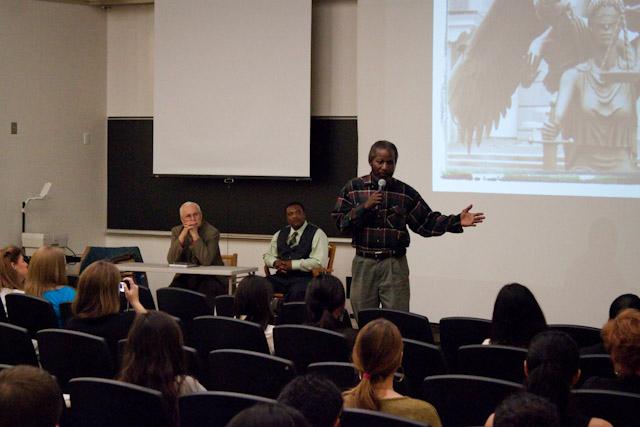
(Kathleen Strauss/The Daily Campus)
Since the U.S. Supreme Court ruled that capital punishment was legal in 1976, the state of Texas has executed 478 people.
For many Americans, the death penalty is seen as a part of a complex judicial system that ultimately protects the majority from a dangerous minority.
Except in cases of extreme controversy like that of Troy Davis in September, the death penalty is an issue that often goes ignored by the American public.
“If you think this is not your issue, I would urge you to get out of your naiveté,” Rick Halperin, director of the SMU Embrey Human Rights program, said to a packed McCord Auditorium.
In the upcoming presidential election, candidates on both sides of the aisle are for the death penalty.
“You should really be aware of the implications of your voting. You are voting for people who have said they would kill someone,” Halperin said.
A panel discussion on the death penalty in Texas on Thursday night portrayed an often-untold perspective of capital punishment.
Exonerees Anthony Graves and Clarence Brandley along with the Rev. Carroll Pickett, a former death row chaplain, presented their arguments against a punishment often described as inhumane.
“Most of you weren’t even born when I went through this hell 23 years ago,” Brandley said.
Brandley was wrongfully convicted of the rape and murder of a 16-year-old student. He spent nine years on death row.
His first trial ended in a hung jury. But just a few weeks later, he was sentenced to death.
Brandley was desperate for media and legal attention when an overzealous prosecution convicted him.
“I passed my polygraph test and no one cared,” Brandley said. “But if I had failed, all the news media would have been all over it.”
He urged the crowd to carefully examine the merits of the justice system in America before deciding on the capital punishment issue.
“Don’t let anyone tell you that your vote doesn’t count,” Brandley said. “I don’t understand how someone can sign a death warrant and go to bed that night. I don’t know what kind of God he serves.”
Brandley’s impassionate speech for political activism was followed by the Rev. Pickett’s discussion on the evolution of his views on the death penalty.
“I was in favor of the death penalty because my grandfather was murdered when my father was just 12,” Pickett said. “I assumed that no one was just found to be guilty without cause.”
Pickett was known as the death chaplain at the Huntsville prison because he was the last religious figure that saw death row inmates before their executions.
The former chaplain now regrets his former stance on the death penalty issue.
“I buried 4,000 inmates who died in prison and watched over 95 executions,” Pickett said. “The longer I was at the prison and talked to people, I realized that the death penalty was wrong.”
Pickett listed multiple reasons for why the death penalty was not a practical punishment.
He listed the high public costs of the death penalty, cruel and unusual treatment of prisoners and the ineffectiveness of the death penalty as a crime deterrent as reasons to look at other punishment alternatives.
However, Pickett saved his best reasons for last.
“We have executed innocent people because of faulty eyewitness testimony,” Pickett said. “And even worse, before someone dies, they strip search him and leave him naked in a 9-by-9 room waiting to die.”
A silent crowd, shocked by the horrors of capital punishment, listened to Anthony Graves’ story on how he spent 18 years in jail.
Graves was wrongfully convicted of killing four children, one teenager and an adult woman.
“I didn’t even know the family. I didn’t live in that area,” Graves said.
A single personal statement caused the Texas Rangers to pursue Graves for the crime.
“It was never about seeking the truth [in my case]. Someone just had to pay for the horrendous crime,” Graves said.
Graves criticized the lack of accountability and checks in the judicial system.
“Prosecutors have total immunity. Politicians have no accountability,” Graves said. “This whole notion of ‘innocent until proven guilty’ should be thrown out the window.”
According to Graves, there is a very real racial problem in the American judicial system.
“The post-racial era is a myth. Ask my mother if race doesn’t matter when you go to prison and you’ll know the truth,” Graves said.
In front of an audience that did not take its eyes off the emotional Graves, he called for individual action from everyone in the crowd.
“No one here cared when I was locked up, and it’s because all of this is being done in your name,” Graves said. “You should never buy into the story that the death penalty makes society better and safer. All the power rests in your hands. It’s time to hold people accountable.”








